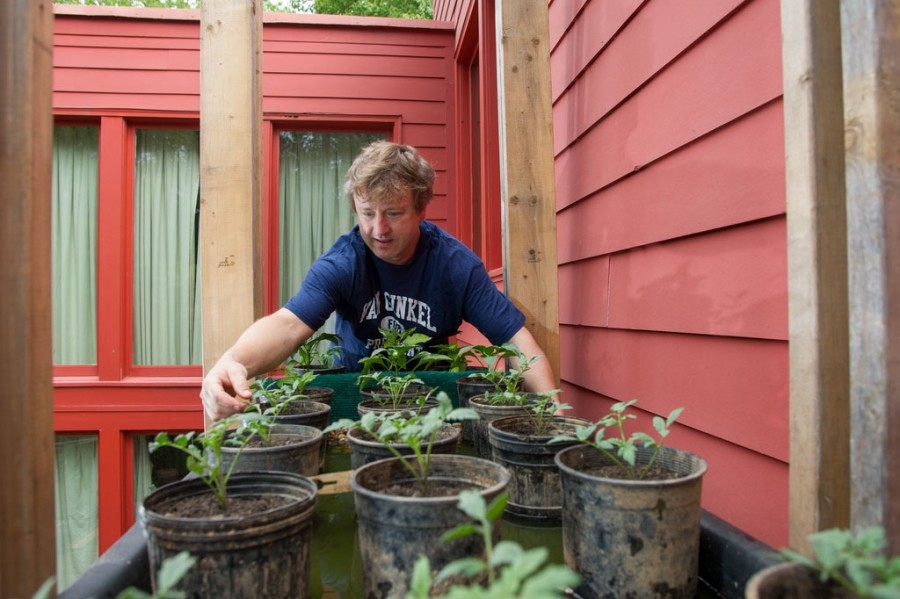
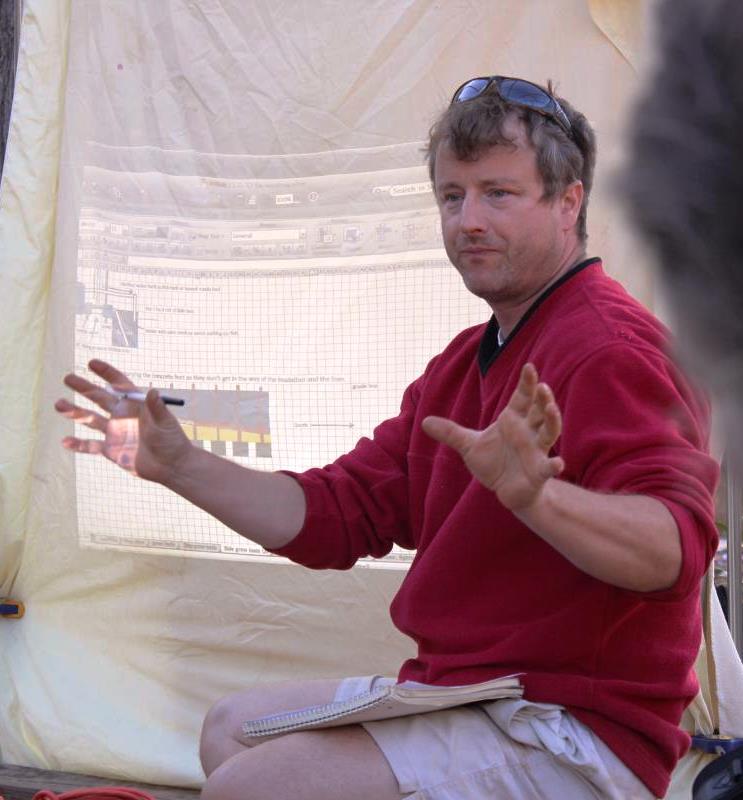 CEE research engineer Steven W. Van Ginkel is on a mission: promote sustainable urban farming as a way to bring healthy food to what he calls "food deserts" — areas with limited access to fresh, affordable groceries. Along the way, he believes people can learn some valuable lessons about community and green living.
CEE research engineer Steven W. Van Ginkel is on a mission: promote sustainable urban farming as a way to bring healthy food to what he calls "food deserts" — areas with limited access to fresh, affordable groceries. Along the way, he believes people can learn some valuable lessons about community and green living.
Though he's been at Georgia Tech for less than two years, the Iowa native is already having an impact.
In April Van Ginkel received the Georgia Tech Earth Day Environmental Leadership Award - an honor given to individuals or groups that have had a significant, long-term environmental impact on campus.
The award recognizes Van Ginkel’s work in several areas. In addition to collaborating on Department of Energy (DOE)-funded research to enhance the productivity of biodiesel from algae, he is heading up the Sustainable Aquaponic Systems (SAS), Georgia Tech’s urban aquaponics initiative.
Aquaponics is the simultaneous cultivation of fish and vegetables using the same space and resources. Van Ginkel is passionate about using this concept to help city dwellers grow their own food by making use of the small, often ignored spaces such as abandoned warehouses, rooftops, basements, porches, vacant lots, or even fish taco stands along the beltline.
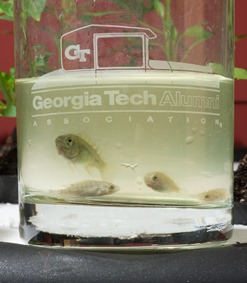 “You simply feed the fish, then automatically – the fish waste feeds the plants, and the plants clean the water for the fish all in one recirculating closed-loop system,” he explained.
“You simply feed the fish, then automatically – the fish waste feeds the plants, and the plants clean the water for the fish all in one recirculating closed-loop system,” he explained.
Ultimately, Van Ginkel sees his academic research as complementing his personal interest in alleviating food deserts.
"The DOE has stated that if biodiesel production from algae is to be successful in the near term, we have to find value in other parts of the algae," he said.
"In the non-lipid fractions that don’t go into making biodiesel, there are a lot of carbohydrates and proteins that make the perfect fish food. Indeed, fish farming is one of only a few commercial-scale uses for algae today. Once biodiesel production ramps up in the United States, I envision co-locating aquaponic systems next to algae-biodiesel farms."
Van Ginkel believes those system could substantially address the scarcity of fresh foods in urban environments, where consumers often turn to less healthy foods due to limits in their income, mobility, and choices. Typically, this has led to a variety of health problems, as people ingest too many calories trying to get the nutrients they need.
“Aquaponics has to be profitable to be widely available, so the SAS is trying to make aquaponics as efficient as possible to keep costs down,” he said. “The SAS system is a net-zero water, energy, and nutrient system in that it uses rainwater for all its water needs, and solar energy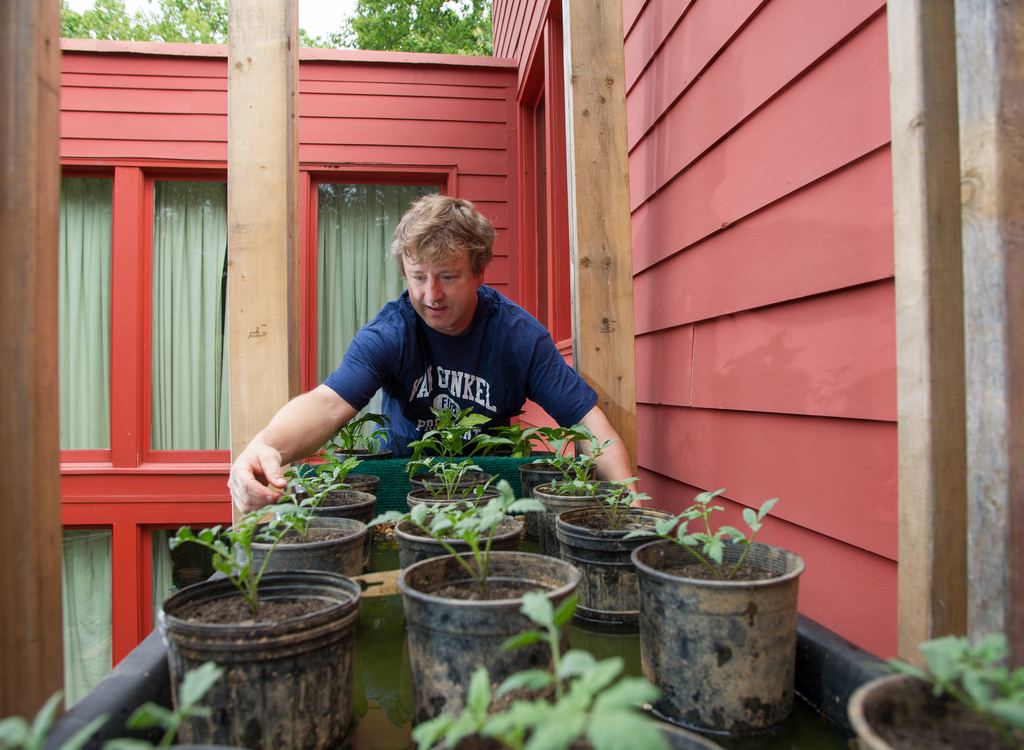 for its pumping, aeration, heating, and cooling needs”
for its pumping, aeration, heating, and cooling needs”
Recycled food waste is then processed to feed the fish.
“As our freshwater and phosphorus [fertilizer] supplies diminish, and energy costs to transport vegetables cross-country continue to increase, there is more and more emphasis on growing food close to home in a sustainable manner. Aquaponics does this.”
The establlishment of algae-biodiesel farms would do a lot to further his vision, but Van Ginkel is not waiting for that to happen. Looking around his adopted home of Atlanta, he has seen a lot of foreclosed or un-performing properties, land which aquaponic growing systems could convert to urban farming now.
“I think America would be truly blessed if this kind of healthy food was as accessible as fast food. Our current food system is controlled by relatively few people, it’s unhealthy, not democratic, and it may not be resilient. It’s time for a change and with our economy as it is today, the current time is perfect for this change.“
Eventually, Van Ginkel would like to see an aquaponics system at Georgia Tech that would utilize many resources that are currently overlooked: food waste from dining halls, rainwater, and sunlight. Harvested correctly, these resources could be used to produce fresh food for the campus dining halls.
“I am not alone in seeing these possibilities. The Students Organizing for Su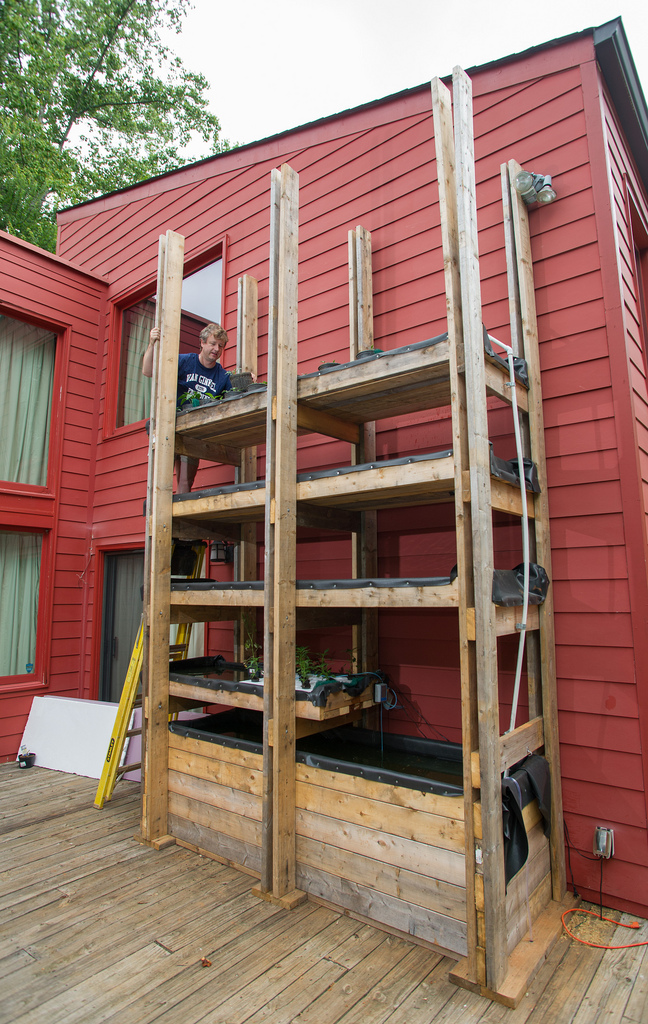 stainability group has created a community garden on west campus, and there’s also the GT Urban Honey Bees Project and Atlanta Harvest,” he says. “Georgia Tech is open to these sorts of innovations. Campus dining has already expressed great interest in seeing what we can produce and adding it to their menus.”
stainability group has created a community garden on west campus, and there’s also the GT Urban Honey Bees Project and Atlanta Harvest,” he says. “Georgia Tech is open to these sorts of innovations. Campus dining has already expressed great interest in seeing what we can produce and adding it to their menus.”
Van Ginkel is also one of the advisors for Urban Bios, a student group that is planning to build an aquaponics system at the community garden site on campus. He hopes the group will eventually grow algae-based fish feed that is high in heart-healthy omega-3 fatty acids. Omega-3 fatty acids are another algae product grown commercially today.
“I subscribe to the ‘Give a man a fish and he’ll eat for a day; teach a man to (grow his own) fish (and produce) and he’ll eat (and others will too) for a lifetime’ philosophy, so I am always willing to help out another person who wants to learn about this practice,” he says. “Eventually, I’d like to see this become so widespread that it’s considered common.”
Steven W. Van Ginkel received his undergraduate degrees in fisheries and environmental engineering from Iowa State University. He holds a doctorate in environmental engineering from Pennsylvania State University. To find out more, contact him at Steven.van.Ginkel@ce.gatech.edu
